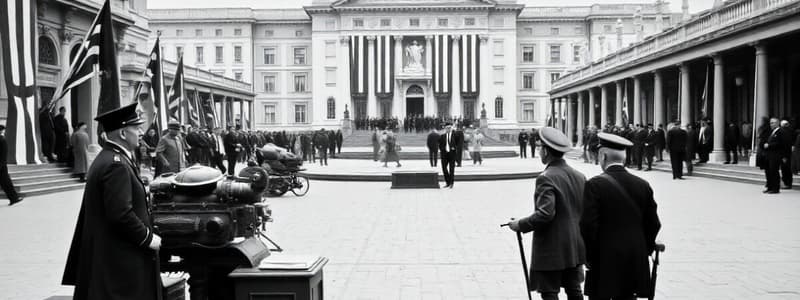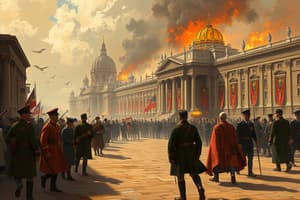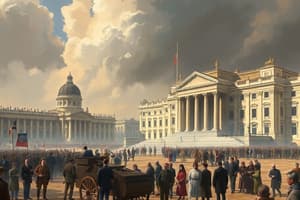Podcast
Questions and Answers
What was the primary goal of the Committee on Public Information during World War I?
What was the primary goal of the Committee on Public Information during World War I?
- To oversee military operations overseas
- To investigate espionage activities
- To create peace treaties between warring nations
- To promote the war efforts and gather public support (correct)
Which event directly prompted the U.S. to enter World War I?
Which event directly prompted the U.S. to enter World War I?
- The sinking of the Lusitania
- The Zimmerman Note (correct)
- The assassination of Archduke Ferdinand
- The signing of the Treaty of Versailles
What was one of the significant outcomes of the Treaty of Versailles for Germany?
What was one of the significant outcomes of the Treaty of Versailles for Germany?
- Gaining new territories in Europe
- Being held responsible for the war and forced to pay reparations (correct)
- Forming a coalition with other Central Powers
- Implementing a permanent military occupation
Which act made it a crime to interfere with the U.S. military operations or promote disloyalty during World War I?
Which act made it a crime to interfere with the U.S. military operations or promote disloyalty during World War I?
Which term refers to the mass movement of African Americans from the rural South to urban areas in the North during and after World War I?
Which term refers to the mass movement of African Americans from the rural South to urban areas in the North during and after World War I?
Flashcards
Lusitania
Lusitania
The sinking of the Lusitania by a German U-boat in 1915, which killed 128 Americans, intensified public outrage against Germany and helped push the United States toward entering World War I.
Convoy System
Convoy System
A system of protecting merchant ships from attack by submarines during WWI, where ships traveled in groups with armed escorts.
Espionage Act & Sedition Act
Espionage Act & Sedition Act
A series of laws passed during WWI that made it illegal to criticize the government or the war effort, targeting anti-war dissenters and suppressing freedom of speech.
Red Scare
Red Scare
Signup and view all the flashcards
Great Migration
Great Migration
Signup and view all the flashcards
Study Notes
The Period Between 1895-1925 (WWI)
- The period from 1895 to 1925 saw significant global events, including World War I.
- The Committee on Public Information (CPI) was a US government agency used to influence public opinion during WWI.
- The Zimmerman Note was a coded telegram from Germany to Mexico proposing an alliance.
- The Treaty of Versailles formally ended WWI and imposed significant punishments on Germany.
- The League of Nations was established to prevent future wars, but faced challenges in achieving this goal.
- The MAIN causes of WWI were Militarism, Alliances, Imperialism, Nationalism.
- The Espionage Act and the Sedition Act were US laws that restricted freedom of speech during WWI.
- Germany surrendered in 1918.
- Punishments imposed on Germany after WWI included territorial losses, disarmament, and financial reparations.
- U-boats, German submarines, were a significant naval component of the war.
- Casualties during WWI totaled millions across all participating nations.
- Convoy systems were used to protect ships from submarine attacks.
- WWI significantly impacted women and minorities in the US through increased opportunities in the workforce.
- Imperialism is the policy of extending a country's power and influence through diplomacy or military force. Its types include colonialism, economic control, and cultural influence. Its goals included acquiring resources, markets, and strategic locations. Imperialism occurred in Africa, Asia, and the Pacific.
- John J. Pershing was a prominent US general during WWI.
- Woodrow Wilson was the US President during WWI.
- Wilson's 14 Points were a statement of peace aims.
- The Red Scare was a period of intense anti-communist sentiment in the US after WWI.
- Significant battles of WWI included the Marne, Somme, and Meuse-Argonne offensives.
- The Lusitania was a British passenger ship sunk by a German U-boat, contributing to US involvement in the war.
- The Selective Service Act established a draft system for the US military during WWI.
- The Sacco and Vanzetti case involved the controversial trial of two Italian immigrants accused of murder.
- The Great Migration was the movement of African Americans from the South to the North of the United States.
- The Anti-Imperialist League opposed the US acquisition of overseas territories following the Spanish American War.
- The influenza epidemic of 1918 was a global pandemic causing significant mortality.
Studying That Suits You
Use AI to generate personalized quizzes and flashcards to suit your learning preferences.




